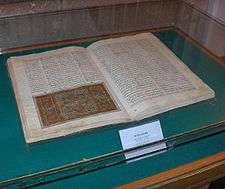Diwan-e Shams-e Tabrizi

Dīvān-e Kabīr or Dīvān-e Šams-e Tabrīzī (The Works of Šams Tabrīzī) (Persian: دیوان شمس تبریزی) or Dīvān-e Šams is one of Mawlānā Jalāl-ad-Dīn Muhammad Balkhī's masterpieces. A collection of lyric poems that contains more than 40,000 verses, it is written in the New Persian language and is considered one of the greatest works of Persian literature.
Dīvān-e Kabīr ("the great divan") contains poems in several different styles of Eastern-Islamic poetry (e.g. odes, eulogies, quatrains, etc.). It contains 44,282 lines (according to Foruzanfar's edition,[1] which is based on the oldest manuscripts available): 3,229 odes, or ghazals (total lines = 34,662); 44 tarji-bands (total lines = 1698); and 1,983 quatrains (total lines = 7932).[2] Although most of the poems are in New Persian, there are also some in Arabic, and a small number of mixed Persian/Greek and Persian/Turkish poems. Dīvān-e Šams-e Tabrīzī is named in honour of Rumi's spiritual teacher and friend Shams Tabrizi.

Mevlâna mausoleum, Konya, Turkey
References
- ↑ Furuzanfar, Badi-uz-zaman. Kulliyat-e Shams, 8 vols., Tehran: Amir Kabir Press, 1957–66. Critical edition of the collected odes, qutrains and other poems of Rumi with glossary and notes.
- ↑ http://www.dar-al-masnavi.org/about_divan.html
